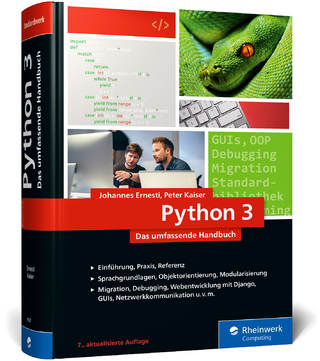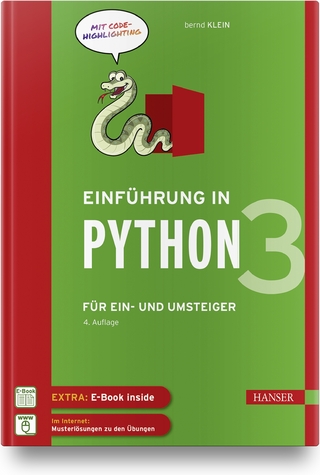
Python for the Life Sciences
Apress (Verlag)
978-1-4842-4522-4 (ISBN)
Virtually all of the examples in the book are drawn from across a wide spectrum of life science research, from simple biochemical calculations and sequence analysis, to modeling the dynamic interactions of genes and proteins in cells, or the drift of genes in an evolving population.
Best of all, Python for the Life Sciences shows you how to implement all of these projects in Python, one of the most popular programming languages for scientific computing. If you are a life scientist interested in learning Python to jump-start your research, this is the book for you.
What You'll Learn
Write Python scripts to automate your lab calculations
Search for important motifs in genome sequences
Use object-oriented programming with Python
Study mining interaction network data for patterns
Review dynamic modeling of biochemical switches
Who This Book Is For
Life scientists with little or no programming experience, including undergraduate and graduate students, postdoctoral researchers in academia and industry, medical professionals, and teachers/lecturers.
“A comprehensive introduction to using Python for computational biology... A lovely book with humor and perspective” -- John Novembre, Associate Professor of Human Genetics, University of Chicago and MacArthur Fellow
“Fun, entertaining, witty and darn useful. Amagical portal to the big data revolution” -- Sandro Santagata, Assistant Professor in Pathology, Harvard Medical School
“Alex and Gordon’s enthusiasm for Python is contagious” -- Glenys Thomson Professor of Integrative Biology, University of California, Berkeley
Alex Lancaster is an evolutionary biologist, engineer, writer and consultant. Alex completed his Ph.D. in evolutionary biology at the University of California, Berkeley, and also holds bachelor's degrees in physics and electrical engineering. He has worked in research & development in both Australia and the United States with a major focus on evolutionary and systems biology. He has also worked extensively in genomics, analyzing next-generation sequencing data and has developed tools for clinical and population genomics, with a particular specialization in immunogenetic applications. He has held research and faculty positions in academia, as well as R&D positions in the broadcasting and IT industries. Alex has published many peer-reviewed papers and is interested in solving problems in biology using evolutionary and complex adaptive systems approaches. He has done pioneering work in this area as a co-developer of the open-source agent-based modeling toolkit, Swarm,one of the first tools for large-scale modeling of collective behavior in biology and beyond. He is passionate about the power of open source and open science approaches to accelerate discovery. Gordon Webster has a PhD in biophysics and structural biology from the University of London, Gordon has worked in life science R&D in both Europe and the U.S., with a particular emphasis on molecular engineering and computational biology. In academic and commercial environments ranging from universities and medical schools to small venture capital-funded startups and global pharmaceutical companies, he has served in a diversity of roles from research faculty to company vice president. Gordon is the author of numerous original scientific articles and patents and has created and managed some very successful research partnerships with industrial, academic and government organizations. He initiated and managed the first translational oncology clinical trial at a multinational pharmaceutical company and has coached and led research project teams in large matrix organizations, as well as large, distributed teams of scientists. software developers and technical specialists, working together across multiple time zones. Gordon’s career path has always reflected his belief that the most interesting and potentially promising areas of research lie at the intersections between the traditional scientific disciplines.
1. Getting Started with Python.- 2. Python at the Lab Bench.- 3. Making Sense of Sequences.- 4. A Statistical Interlude.- 5. Open Doors to your Data.- 6. Finding Needles in Haystacks.- 7. Object Lessons.- 8. Slicing and Dicing Genomic Data.- 9. The Wells! The Wells!.- 10. Well on the Way.- 11. Molecules in 3D.- 12. Turning Genes on and off.- 13. Taming the Network Hairball.- 14. Genetic Feedback Loops.- 15. Growing a Virtual Garden.- 16. How the Leopard got its Spots.- 17. Foxes Guarding Hen Houses.- 18. A Virtual Flu Epidemic.- 19. Retracing Life’s Footsteps.
| Erscheinungsdatum | 11.10.2019 |
|---|---|
| Zusatzinfo | 47 Illustrations, color; 116 Illustrations, black and white; XXXVI, 376 p. 163 illus., 47 illus. in color. |
| Verlagsort | Berkley |
| Sprache | englisch |
| Maße | 178 x 254 mm |
| Themenwelt | Informatik ► Programmiersprachen / -werkzeuge ► Python |
| Mathematik / Informatik ► Informatik ► Web / Internet | |
| Naturwissenschaften ► Biologie | |
| Schlagworte | Bioinformatics • Biological Sequence • Computional Biology • Genomic data • Gillespie algorithm • matplotlib library • Python • Python Objects • Simulation |
| ISBN-10 | 1-4842-4522-9 / 1484245229 |
| ISBN-13 | 978-1-4842-4522-4 / 9781484245224 |
| Zustand | Neuware |
| Haben Sie eine Frage zum Produkt? |
aus dem Bereich


